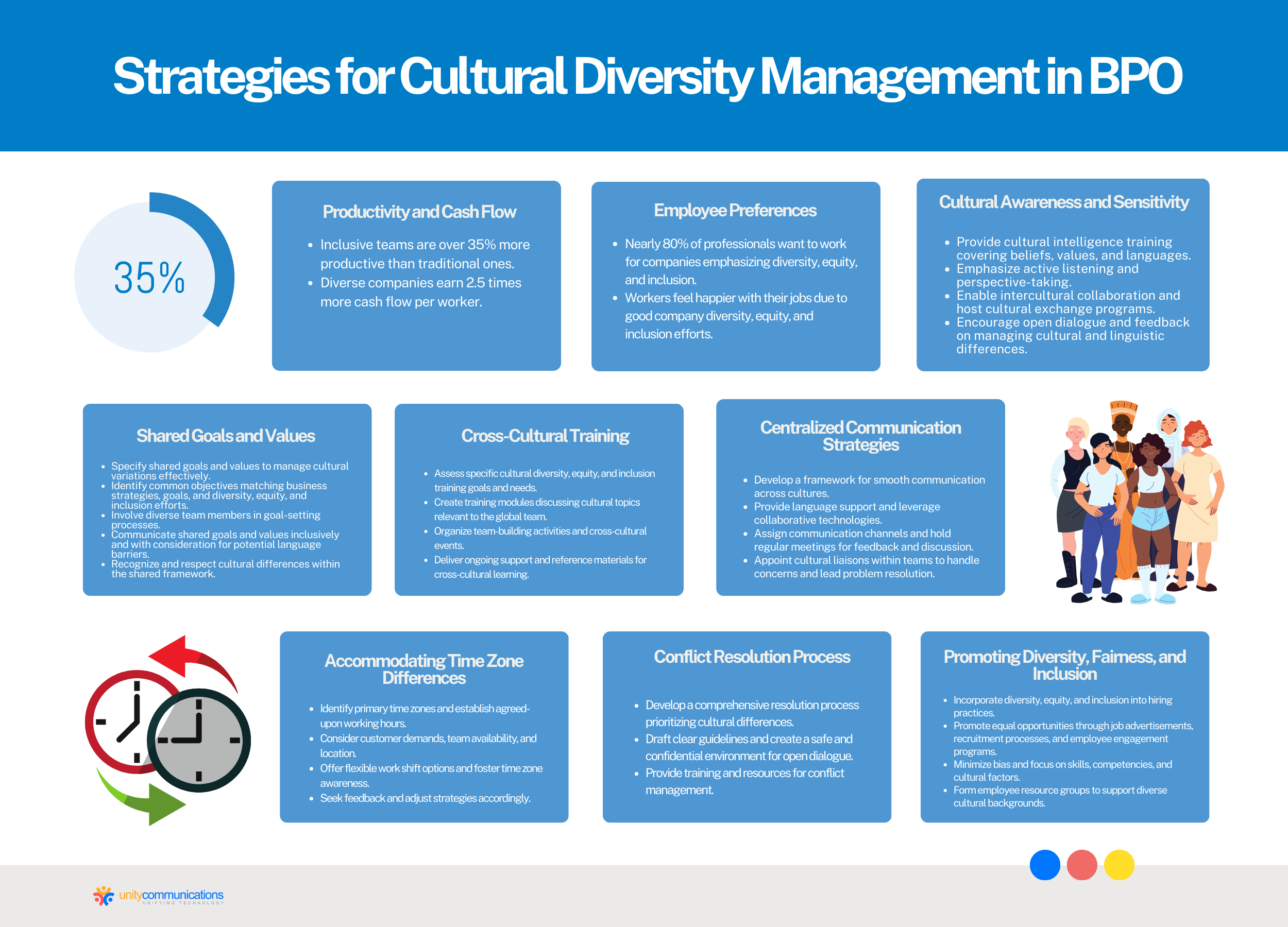IN THIS ARTICLE
Table of Contents
Imagine sitting in the middle of your office with an incredible mix of skilled professionals. You hear them casually talk using their mother tongue, switch to a foreign language during client interactions, and behave based on their own accord while completing their tasks.
That is the diversity of a business process outsourcing (BPO) company. But with such cultural differences, overseeing this group of people seems complicated. Do you want to know how executives simplify orderliness?
You have come to the right page. This article presents some best practices for managing cultural differences in BPO.
The Importance of Addressing Cultural Variations in BPO

The terms onshore, nearshore, and offshore outsourcing appear when you try to search for explanations of what BPO is. Let’s say you operate in the United States. You hire onshore outsourcing when partnering with a New York-based provider, nearshore outsourcing when working with a Canadian vendor, and an offshore outsourcing company when employing a Philippine vendor.
No matter what type of BPO arrangement you choose, cultural diversity impacts your daily operations. Whether physically or remotely, outsourcing assembles people from different countries worldwide, each with its own unique cultural tapestry. However, these differences pose challenges if left unaddressed, including the ones enumerated below:
- Miscommunication and misunderstanding lead to project delays and costly errors.
- Diverse work styles create friction and conflicts within the team.
- Time zone differences hinder project turnaround time and effective communication.
- Poor cultural sensitivity impedes efficiency and teamwork.
- Ethical and legal distinctions affect how a team member approaches tasks and rules.
- Gender discrimination results in inequality and ruins workplace harmony.
- Improper accommodations cause discomfort for employees with disabilities.
But this is important to remember: in every problem lies an appropriate solution. Knowing and implementing best practices for managing cultural differences in BPO resolves the above issues and benefits all parties involved.
Expect these BPO advantages when your potential provider values and has a strong knowledge of varying cultural aspects:
- Achieve smooth and natural-sounding communication.
- Improve productivity, innovation, and collaboration.
- Increase positive customer service feedback and ratings.
- Establish a sense of belonging among professionals.
- Enhance worker morale, retention, and job satisfaction.
- Attract top companies and their loyal customers.
- Meet changing market demands and trends.
- Strengthen market reputation and credibility.
- Expand opportunities and prolong partnerships.
- Boost sales and revenue generation.
Best Practices for Managing Cultural Differences in BPO

According to a recent report from Research and Markets, an inclusive team is over 35% more productive than a traditional workforce. The organization also found that diverse companies earn 2.5 times more cash flow per worker.
Before reaping such benefits, understanding cultural variations and the ways to overcome the associated problems is crucial. To succeed, your in-house and BPO teams should know how to navigate diverse landscapes of nuances, customs, and communication styles.
So to unlock the full potential of a global team, follow these best practices for managing cultural differences in BPO:
Ensure Cultural Awareness and Sensitivity
Start addressing diversity in your BPO project by ensuring cultural awareness and sensitivity. Develop an in-depth understanding of cultural contexts, such as race, ethnicity, gender, religion, and language. Awareness and understanding go a long way toward fostering respect and avoiding misunderstandings.
The latest CNBC and SurveyMonkey Workforce Survey shows nearly 80% of professionals want to work for a company that emphasizes diversity, equity, and inclusion (DEI). The report also reveals that workers feel happier with their jobs due to good company DEI efforts.
Follow these practical tips to promote cultural understanding with your in-house and third-party teams:
- Provide cultural intelligence training that tackles the beliefs, values, and languages influencing work strategies.
- Emphasize active listening, especially for customer support services.
- Practice perspective-taking to help employees appreciate the richness of diverse backgrounds in a business setting.
- Enable intercultural collaboration regardless of BPO roles and responsibilities.
- Host cultural exchange programs to facilitate the sharing of traditions and customs.
- Encourage open dialogue and employee feedback on better managing cultural and linguistic differences.
- Set an example by embracing diverse perspectives and actively implementing DEI initiatives.
Set Shared Goals and Values
As part of your long-term planning for BPO, specify shared goals and values to effectively manage cultural variations. Develop a sense of purpose and unity that transcends all boundaries.
Here are a few ways to make your global teams feel valued and respected:
- Identify common objectives that match your business strategies, goals, and DEI efforts. These targets must be specific, measurable, achievable, relevant, and understandable to all team members.
- Involve in-house and third-party workers from diverse cultural backgrounds in the goal-setting process. Urge them to contribute their perspectives, opinions, and suggestions. This action ensures the objectives reflect consensus.
- Communicate shared goals and values to all workers. Be mindful of potential language barriers. Use inclusive language and provide translations if needed. Consider visual aids or video clips to creatively and effectively explain the targets.
- Recognize and respect cultural differences while defining BPO objectives. Note that people from different cultures might approach goals and values differently. So acknowledge and give room for nuances within the shared framework.
Conduct Cross-Cultural Training
Provide cross-cultural BPO training to help workers appreciate cultural variations and resolve related challenges. By doing so, you set up a harmonious work environment that optimizes the strengths of cultural diversity.
Apply these training-focused best practices when managing cultural differences in BPO:
- Assess specific cultural DEI training goals and needs to measure possible outcomes.
- Create training modules that discuss cultural topics relevant to your global team.
- Organize team-building activities to foster trust and camaraderie among team members.
- Hold cross-cultural events to promote social integration and a sense of belonging.
- Consult experts to learn how to design and deliver intercultural training in BPO.
- Train workers on proper communication etiquette when dealing with various customers.
- Deliver ongoing support and reference materials to reinforce cross-cultural learning.
Establish Centralized Communication Strategies
Establishing clear and centralized communication strategies helps bridge cultural and linguistic gaps in a strategic outsourcing work environment. You should promote neutral language and avoid jargon that is not universally understood.
Below are other best practices for managing cultural differences in BPO communication:
- Develop a framework detailing the fundamental principles and guidelines for smooth communication across cultures.
- To avoid misunderstandings, provide language support, such as translation books and interpretation videos.
- Leverage user-friendly collaborative technologies such as video conferencing apps and shared project management systems for enhanced interactions.
- Assign channels for different types of communication, such as email for formal announcements and instant messaging for real-time information sharing.
- Set regular team meetings, periodic surveys, or one-on-one discussions to let workers share their opinions and suggestions for improved business operations.
- Appoint cultural liaisons within your in-house and third-party teams to handle concerns and lead problem resolution.
Accommodate Time Zone Differences
BPO involves working across different time zones; thus, accommodating this diversity when scheduling meetings or assigning tasks is vital. Synchronous meetings allow for efficient collaboration while minimizing disruptions and project delays.
Follow these tips to effectively address time zone challenges:
- Identify the primary time zone of your BPO partner.
- Establish agreed-upon working hours.
- Consider factors such as customer demands, team availability, and location.
- Offer flexible options for work shifts.
- Form an integrated, single dashboard for primary communication channels.
- Choose team meeting schedules that are favorable for both parties.
- Foster time zone awareness by sending reminders of everyone’s availability.
- Seek feedback from BPO workers regarding time zone accommodation strategies.
- Adjust and refine approaches based on the collected insights and recommendations.
Develop a Conflict Resolution Process
Conflict might arise due to cultural differences, so developing a comprehensive resolution process is necessary. Remember to include open and constructive dialogue when addressing issues. Also, provide training and resources for conflict management.
Draft clear guidelines for conflict resolution that prioritize cultural differences. Create a handbook that outlines the steps to take when problems occur. It should include every worker’s roles and responsibilities, escalation procedures, and timelines for resolution.
Most importantly, create a safe and confidential environment that lets team members express themselves freely without fear of judgment or retaliation. Confidentiality encourages unbiased communication and builds trust.
Promote Diversity, Fairness, and Inclusion
Implement programs that promote diversity, fairness, and inclusion within the global BPO team. You can start by incorporating DEI into your hiring practices. In a Glassdoor-commissioned survey, 80% of polled workers and applicants said a company’s DEI investment is very or somewhat important when looking for a new job.
Hence, promotes equal opportunities for diverse talent pools through job advertisements, recruitment processes, and employee engagement programs. Minimize bias and focus on skills, competencies, and cultural factors.
Moreover, consider forming employee resource groups (ERG) that provide a platform for workers from different cultural backgrounds to connect and support one another. ERGs can host events such as workshops and seminars that raise awareness and celebrate diverse cultures.
Actions to Avoid When Managing Cultural Diversity in BPO
Apart from knowing best practices for managing cultural differences in BPO, you must also know what not to do when addressing DEI in the workplace. To avoid common pitfalls and build an inclusive work environment, here is a list of actions to avoid:
- Stereotyping and generalizing. Refrain from making assumptions or generalizations about each professional based on their cultural background. Take note that cultural diversity encompasses a wide range of perspectives, principles, and experiences. Treat each BPO worker as an individual with equal rights.
- Downplaying cultural distinctions. Avoid dismissing cultural variations and embrace the uniqueness that each cultural background brings to the table. Valuing DEI results in increased productivity and improved cooperation within the BPO team.
- Imposing one culture’s norms. Do not force the standards of one culture onto others. Instead, create an inclusive environment where a BPO unit’s cultural perspectives are acknowledged and respected.
- Excluding workers speaking a different language. Never make third-party workers who speak a foreign language feel out of place. Perceive language differences as opportunities for flexible learning and collaboration.
- Failing to update practices and policies. Avoid maintaining rigid rules and procedures that do not cover cultural diversity. Continuously adjust your organizational routines, processes, and approaches to accommodate the changing needs and preferences of your BPO workers.
- Lacking diverse representation and perspectives. Strive for DEI in leadership positions and decision-making processes. Let executives from different cultures voice their concerns, opinions, and recommendations. This strategy can produce more effective solutions to various challenges.
The Bottom Line

BPO involves working with skilled professionals from around the globe. Challenges such as misinterpretations and conflicts arise due to cultural diversity. However, implementing best practices for managing cultural differences in BPO brings significant advantages to your organization.
From ensuring cultural awareness to fostering DEI, the approaches discussed help ensure smooth interaction and collaboration with your global teams. Minding and avoiding the don’ts also help strengthen your partnership with your BPO partner.
Do you want to work with a service provider that transcends cultural boundaries? Let’s connect and seal a deal. At Unity Communications, expect to meet people who maximize cultural diversity to deliver superior outcomes for your business’s growth in the long run.





